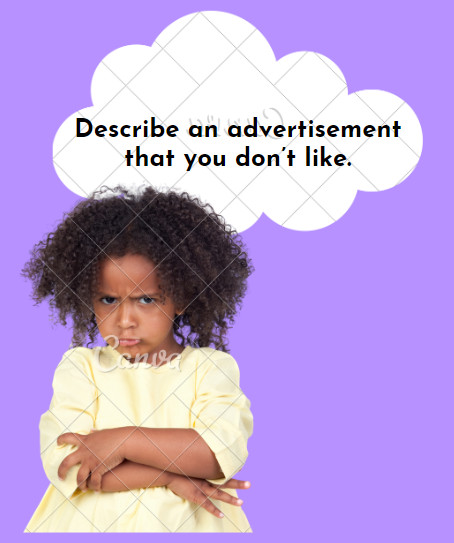
Bài mẫu và từ vựng chủ đề “Describe an advertisement that you don’t like”
You should say:
– When did you see it?
– What is it about?
– Where you saw it/how you came to know about it?
– Why didn’t you like it?
I. Gợi ý lên ý tưởng:
Đối với chủ đề ADVERTISEMENT các bạn có thể mô tả những quảng cáo như Social Media Advertisements, TV Advertisements, Leaflets, Wall Painting Advertisements… Đặc biệt đây là câu hỏi nằm trong chủ đề Describe an object
II. Từ vựng và Cấu Trúc hay cho chủ đề:
- give you a boost of energy: cung cấp năng lượng cho bạn
- on the verge of falling asleep: sắp ngủ gục
- stressed out: căng thẳng
- super energetic and productive: rất năng động và năng suất
- unrealistic: không thực tế
- false expectation: kỳ vọng sai lầm
- exaggerated: phóng đại
- based on false promises: dựa trên những lời hứa sai lầm
- honest and upfront: trung thực và thẳng thắn
III. Bài mẫu:
I’m going to share with you about an advert that I find really annoying because of its insincerity, inauthenticity and misleading effects on our buying behaviors. It is an advertisement about tips to lose 10 kilos in a month.
If I can recall correctly, I came across this advertisement when streaming videos on Youtube a couple of weeks ago. It is eye-catching to everyone who wants to get lean in a short time and I am no exception.
When I clicked on it, a slim and attractive young lady, probably an online influencer, showed up and started to talk about how she had lost 10 kilograms in three months without doing any exercise. In the beginning, she introduced her diet, which is low- carbon and high in protein. This part took only less than a minute. But when coming to the last tip, it became a promotion of a supplement that can block carbohydrate absorption. She boasted about how effective it was for almost 5 minutes. Then came the part about how viewers can get a discount from her link. Not until then did I realize that this video was not an experience – sharing video but an advertisement for a new product.
I would say that
- The information conveyed in the video was unreliable since it gave the audience, specially young people, a false hope that we could get in good shape only by taking those “magical pills”.
- Instead of spreading helpful information for the sake of the general public, they only care about making a profit.
-> This is why I have a deep-seated aversion to most of them .
-> This is why I have a deep-seated aversion to most of them .
IV. Từ vựng tham khảo
- insincerity(n) = inauthenticity(n) = : giả dối
- misleading(n) : gây hiểu lầm
- eye-catching(adj) : bắt mắt
- to get lean: người ít mỡ
- supplement(n) : thực phẩm bổ sung
- block carbohydrate absorption: ngăn chặn hấp thụ carbohydrate
- deep-seated aversion: ác cảm sâu sắc
V. PART 3 QUESTIONS
1. What kind of things advertise most in your country?
In my country, advertising takes many forms, but the most common ones are television commercials, billboards, and social media ads. On top of that, companies also use influencers to promote their products on social media platforms like Instagram and Facebook. And actually, radio ads and print ads in magazines and newspapers are still prevalent in my country.
- billboard (n): biển quảng cáo
- takes many forms: có nhiều hình thức
- influencers : những người có ảnh hưởng
- prevalent: phổ biến
2. Which one is more effective: newspaper advertising or online advertising?
Well, It really depends on the target audience and the nature of the product or service being advertised. I mean newspaper advertising can be effective for reaching older generations who still prefer print media, while online advertising may be more effective for younger, tech-savvy audiences. That said, with the increasing popularity of digital media, online advertising is becoming more and more important in today’s world.
- target audience: đối tượng khách hàng
- tech-savvy: hiểu biết về công nghệ
- digital media: phương tiện kỹ thuật số



